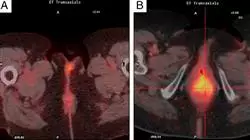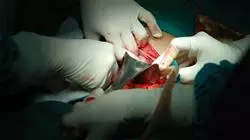University certificate
The world's largest faculty of medicine”
Introduction to the Program
New advances in gynecologic oncology drive us to develop new programs that meet the real needs of experienced professionals, so that they can incorporate new advances into their daily practice”

Vulvar cancer is the fifth most common genital cancer for women. Sometimes it goes unnoticed because it occurs in elderly women for whom the proper recognition and diagnosis of the disease is very difficult. In many cases these women also have mixed symptomatology of benign diseases, which further complicates the diagnosis of differences.
It is essential for specialist physicians to be up to date with the main issues relating to the Vulvar Cancer Epidemiology and Diagnosis, since the wide-ranging advances that are constantly being made and published must be transferred to daily medical practice.
This program is aimed at providing the professional with an update on the epidemiology, causes and the entire diagnostic process for vulvar tumor pathology.
Besides, graduates will have the opportunity to access an exhaustive and exclusive Masterclass, aimed by a prestigious international specialist in Gynecologic Oncology. This will allow them to easily keep up to date on the latest scientific advances on the cancer in the female reproductive system. This is a great opportunity to renew your daily clinical practice in the diagnosis and treatment of various types of tumors in women.
You will have access to a unique Masterclass taught by an internationally renowned specialist in Gynecologic Oncology. The best way to get up to date is at TECH!”
This Postgraduate certificate in Vulvar Cancer Epidemiology and Diagnosis contains the most complete and up-to-date scientific program on the market. The most important features include:
- The examination of clinical cases, presented by specialists in gynecologic oncology and other disciplines: The graphic, schematic, and practical contents with which they are created, provide scientific and practical information on the disciplines that are essential for professional practice
- An update on the epidemiology of vulvar cancer
- Diagnostic techniques and procedures for vulvar cancer
- An algorithm-based interactive learning system for decision-making in the clinical situations presented throughout the course
- All of this will be complemented by theoretical lessons, questions to the expert, debate forums on controversial topics, and individual reflection assignments
- Content that is accessible from any fixed or portable device with an Internet connection
This Postgraduate certificate is the best investment you can make when selecting a refresher program, for two reasons: in additionto updating your knowledge on the Vulvar Cancer Epidemiology and Diagnosis, you will obtain a Postgraduate certificate issued from TECH Global University"
The program’s teaching staff includes professionals from the sector who contribute their work experience to this educational program, as well as renowned specialists from leading societies and prestigious universities.
The multimedia content, developed with the latest educational technology, will provide the professional with situated and contextual learning, i.e., a simulated environment that will provide immersive education programmed to learn in real situations.
This program is designed around Problem-Based Learning, whereby the professional must try to solve the different professional practice situations that arise during the course. For this purpose, students will be assisted by an innovative interactive video system created by renowned and experienced experts.
You will be able to learn about the latest advances in the Vulvar Cancer Epidemiology and Diagnosis using the latest educational technology”

It includes clinical cases and real images in high definition to bring clinical practice as close as possible to the development of the program"
Why study at TECH?
TECH is the world’s largest online university. With an impressive catalog of more than 14,000 university programs available in 11 languages, it is positioned as a leader in employability, with a 99% job placement rate. In addition, it relies on an enormous faculty of more than 6,000 professors of the highest international renown.

Study at the world's largest online university and guarantee your professional success. The future starts at TECH”
The world’s best online university according to FORBES
The prestigious Forbes magazine, specialized in business and finance, has highlighted TECH as “the world's best online university” This is what they have recently stated in an article in their digital edition in which they echo the success story of this institution, “thanks to the academic offer it provides, the selection of its teaching staff, and an innovative learning method aimed at educating the professionals of the future”
A revolutionary study method, a cutting-edge faculty and a practical focus: the key to TECH's success.
The most complete study plans on the university scene
TECH offers the most complete study plans on the university scene, with syllabuses that cover fundamental concepts and, at the same time, the main scientific advances in their specific scientific areas. In addition, these programs are continuously being updated to guarantee students the academic vanguard and the most in-demand professional skills. In this way, the university's qualifications provide its graduates with a significant advantage to propel their careers to success.
TECH offers the most comprehensive and intensive study plans on the current university scene.
A world-class teaching staff
TECH's teaching staff is made up of more than 6,000 professors with the highest international recognition. Professors, researchers and top executives of multinational companies, including Isaiah Covington, performance coach of the Boston Celtics; Magda Romanska, principal investigator at Harvard MetaLAB; Ignacio Wistumba, chairman of the department of translational molecular pathology at MD Anderson Cancer Center; and D.W. Pine, creative director of TIME magazine, among others.
Internationally renowned experts, specialized in different branches of Health, Technology, Communication and Business, form part of the TECH faculty.
A unique learning method
TECH is the first university to use Relearning in all its programs. It is the best online learning methodology, accredited with international teaching quality certifications, provided by prestigious educational agencies. In addition, this disruptive educational model is complemented with the “Case Method”, thereby setting up a unique online teaching strategy. Innovative teaching resources are also implemented, including detailed videos, infographics and interactive summaries.
TECH combines Relearning and the Case Method in all its university programs to guarantee excellent theoretical and practical learning, studying whenever and wherever you want.
The world's largest online university
TECH is the world’s largest online university. We are the largest educational institution, with the best and widest online educational catalog, one hundred percent online and covering the vast majority of areas of knowledge. We offer a large selection of our own degrees and accredited online undergraduate and postgraduate degrees. In total, more than 14,000 university degrees, in eleven different languages, make us the largest educational largest in the world.
TECH has the world's most extensive catalog of academic and official programs, available in more than 11 languages.
Google Premier Partner
The American technology giant has awarded TECH the Google Google Premier Partner badge. This award, which is only available to 3% of the world's companies, highlights the efficient, flexible and tailored experience that this university provides to students. The recognition as a Google Premier Partner not only accredits the maximum rigor, performance and investment in TECH's digital infrastructures, but also places this university as one of the world's leading technology companies.
Google has positioned TECH in the top 3% of the world's most important technology companies by awarding it its Google Premier Partner badge.
The official online university of the NBA
TECH is the official online university of the NBA. Thanks to our agreement with the biggest league in basketball, we offer our students exclusive university programs, as well as a wide variety of educational resources focused on the business of the league and other areas of the sports industry. Each program is made up of a uniquely designed syllabus and features exceptional guest hosts: professionals with a distinguished sports background who will offer their expertise on the most relevant topics.
TECH has been selected by the NBA, the world's top basketball league, as its official online university.
The top-rated university by its students
Students have positioned TECH as the world's top-rated university on the main review websites, with a highest rating of 4.9 out of 5, obtained from more than 1,000 reviews. These results consolidate TECH as the benchmark university institution at an international level, reflecting the excellence and positive impact of its educational model.” reflecting the excellence and positive impact of its educational model.”
TECH is the world’s top-rated university by its students.
Leaders in employability
TECH has managed to become the leading university in employability. 99% of its students obtain jobs in the academic field they have studied, within one year of completing any of the university's programs. A similar number achieve immediate career enhancement. All this thanks to a study methodology that bases its effectiveness on the acquisition of practical skills, which are absolutely necessary for professional development.
99% of TECH graduates find a job within a year of completing their studies.
Postgraduate Certificate in the Epidemiology and Diagnosis of Vulvar Cancer
Vulvar cancer is an increasingly frequent pathology in today's society, so its study and approach are fundamental in modern medicine. The Postgraduate Certificate in Epidemiology and Diagnosis of Vulvar Cancer provides the specialist physician with the necessary tools for early diagnosis and effective treatment.This Postgraduate Certificate focuses on the latest scientific evidence and the most advanced procedures in the field of epidemiology and diagnosis of vulvar cancer. In addition, it is designed to suit the needs of the specialist physician and to facilitate their update on the latest advances in the field.Knowledge of the epidemiology of vulvar cancer is essential for the prevention and early diagnosis of the disease. This Postgraduate Certificate provides healthcare professionals with the necessary knowledge about risk factors, incidence and prevalence, and methods of prevention and early diagnosis.
Discover the latest advances in gynecologic oncology.
In terms of diagnosis, this Postgraduate Certificate focuses on the most advanced and effective procedures for the early diagnosis of vulvar cancer, such as colposcopy and biopsy. In addition, it delves into imaging techniques and new technologies that allow greater accuracy in diagnosis and better selection of treatments.updating on the latest advances in the epidemiology and diagnosis of vulvar cancer is essential to ensure a quality and safe clinical practice. This Postgraduate Certificate in Epidemiology and Diagnosis of Vulvar Cancer provides healthcare professionals with the necessary tools to offer their patients the best treatment and the highest quality of life.







